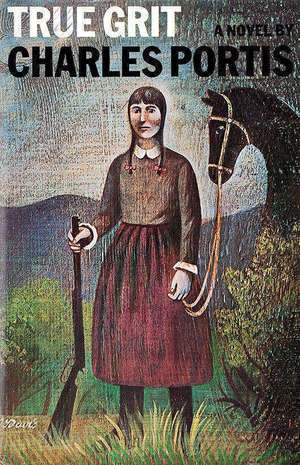There is a scene — a rollicking, blistering, frightful gunfight — near the end of True Grit that is as riveting as any action sequence from Hollywood. But that climactic shootout isn’t the best part of the novel by Charles Portis.
The best part is Mattie Ross, the book’s audacious, plain-speaking, bold and brazen, fearless narrator. She’s 14, out to avenge her father’s murder, going after the culprit who shot him dead.

“Tom Chaney would pay for this,” she rages. “I would not rest easy until that Louisiana cur was roasting and screaming in hell!” She describes the killer as “a short man with cruel features. I will tell more about his face later,” before recording this contemptuous observation: “He had no gun, but he carried his rifle slung across his back on a piece of cotton plow line. There is trash for you. He could have taken an old piece of harness and made a nice leather strap for it. That would have been too much trouble.”
Mattie becomes our eyes and ears as we visit the rugged, lawless 1870s frontier West, where gunslingers went bounty hunting, Indians still roamed the peripheries and hangings were public entertainment. She is a source of glittering insight, humor and perception, a well of strength and determination, and a brilliant mental sharpshooter unafraid to stand her ground, outsmarting the men in that mythic man’s world. She is an astute, likable, captivating narrator in the ranks of Holden Caulfield, Ishmael, Huckleberry Finn and Celie from The Color Purple.
Donna Tartt, whose book, The Goldfinch, won the Pulitzer Prize for fiction in 2014, has called Mattie’s voice “a tremendous gift,” explaining that Portis, who published the novel in 1968, “caught better than any writer then alive the complex and highly inflected regional vernacular I heard spoken as a child — mannered and quaint, old-fashioned and highly constructed but also blunt, roughshod, lawless, inflected by Shakespeare and Tennyson and King James but also by agricultural gazetteers and frilly old Christian pamphlets, by archaic dictionaries of phrase and fable, by the voices of mule drivers and lady newspaper poets and hanging judges and hellfire preachers.”
But Mattie deserves attention for reasons other than her narrative voice. She is, at 14, a strong woman. Independent, sharp, savvy, resourceful, unflinching, undeterred in her quest. A role model, a force, a hero ahead of her time — of our time, as trending storytellers still look to create female leads with such strength and smarts.
There she was 50 years ago, her tale first serialized in the Saturday Evening Post before her saga became a notable book in 1968, although probably best known because of two movie versions. John Wayne won his only Oscar for the 1969 adaptation, and Joel and Ethan Coen directed Jeff Bridges in a 2010 remake. Kim Darby played Mattie in the first, Hailee Steinfeld in the second.
I haven’t seen either, so I came to the book without preconceived notions or expectations or knowledge of unfolding events — and without knowing how that final gunfight turned out. Movies are an art form unto themselves, and these two incarnations have earned their audiences as classic Westerns. The book also provides action and crisp, potent dialogue. But it also takes us into Mattie’s head. It’s a first-person rendering of events; there’s an interior landscape to be traveled as well. And just as the movie version of The Outsiders forfeits an essential element when it loses Ponyboy’s storytelling, Mattie’s voice gives the novel richer dimensions hard to convey on screen.
That said, the book works mainly because it’s fun to read. A good tale told well — and told through Mattie’s singular voice — provides a welcome off-ramp to all going on in the world these days, an antidote and escape from the pandemic and politics, wildfires and hurricanes.
We meet Mattie as she embarks on a venture to Fort Smith, Arkansas, some 70 miles from the family place outside Dardanelle in Yell County. It was there, in Fort Smith, where her father was killed and lost a pack of horses. Intent on getting the horses back and hunting down Chaney, she is also looking to recruit a gunfighter to help in this mission (not to do it for her). She is looking for the meanest, least merciful among the orneriest guns for hire. A man to help her bring Chaney down — a man, she says, with true grit.
By book’s end, after her expedition with the likes of Rooster Cogburn and the Texas Ranger LaBoeuf, as we learn we have been listening to Mattie as an old woman recounting her teenage adventure, we realize it was she who possessed true grit all along.
Kerry Temple is editor of this magazine. He has ancestors a few generations back who lived in Fort Smith, Arkansas.